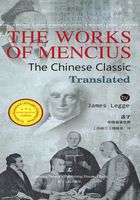
CHAPTER VIII
1. Shăn T'ung, on his own impulse, asked Mencius,saying, 'May Yen be smitten?' Mencius replied, 'It may.Tsze-k'wâi had no right to give Yen to another man,and Tsze-chih had no right to receive Yen from Tszek'wâi. Suppose there were an officer here, with whom you, Sir, were pleased, and that, without informing the king, you were privately to give to him your salary and rank; and suppose that this officer, also without the king's orders, were privately to receive them from you— would such a transaction be allowable? And where is the difference between the case of Yen and this?'


For 为有财, some would give 而有财. The 而 reads better, but the meaning is the same.
4. 比 (the 4th tone) 化者,—the same as 比死者 in Bk.I. Pt. I. v. i. 化 is used appropriately with reference to the dissolution of the bodies of the dead. 肤, 'skin'=the bodies. 恔, the 4th tone, hsüio. 独无恔乎,—the meaning is—'shall this thing alone give no satisfaction to a son's feelings?'
5. 不以天下云云.—Châo Ch'î interprets this:—'will not deny anything in all the world which he can command to his parents'. So, substantially, the modern paraphrasts.
CHAPTER 8. DESERVED PUNISHMENT MAY NOT BE INFLICTED. BUT BY PROPER AUTHORITY. A STATE ON NATION MAY ONLY BE SMITTEN BY THE MINISTER OF HEAVEN.
1. The incidents in the history of Yen referred to are briefly these:—Tsze-k'wâi, a weak silly man,was wrought upon to resign his throne to his prime minister Tsze-chih, in the expectation that Tsze-chih would decline the honour,


2. The people of Ch'î smote Yen. Some one asked Mencius, saying, 'Is it really the case that you advised Ch'î to smite Yen?' He replied, 'No. Shăn T'ung asked me whether Yen might be smitten, and I answered him, "It may." They accordingly went and smote it. If he had asked me—"Who may smite it?" I would have answered him, "He who is the minister of Heaven may smite it." Suppose the case of a murderer, and that one asks me—"May this man be put to death?" I will answer him—"He may." If he ask me—"Who may put him to death?" I will answer him, "The chief criminal judge may put him to death." But now with one Yen to smite another Yen:— how should I have advised this?'


2. 应, the 4th tone. 彼然,—彼 refers to the king and people of Ch'î.彼如曰,—彼 refers only to Shăn T'ung.天吏, see Pt. I. v. 6. The one Yen is of course Ch'î, as oppressive as Yen itself.
and that thus he would be praised as acting the part of the ancient Yâo, while he retained his kingdom. Tszechih, however, accepted the tender, and Tsze-k'wâi was laid upon the shelf. By-and-by, his son endeavoured to wrest hack the throne, and great confusion and suffering to the people ensued. Compare Bk. I. Pt. II.x, xi. I. Shăn (so read, as a surname) T'ung appears to have been a high minister of the State. It is difficult to find a word by which to translate 伐, which implies the idea of Yen's deserving to be punished. 吾子,—referring to Shăn T'ung, but we cannot translate it literally in English. 夫士也, 夫, in the 2nd tone,=斯;士 is the same person as 仕 above, 'a scholar seeking official employment'.

